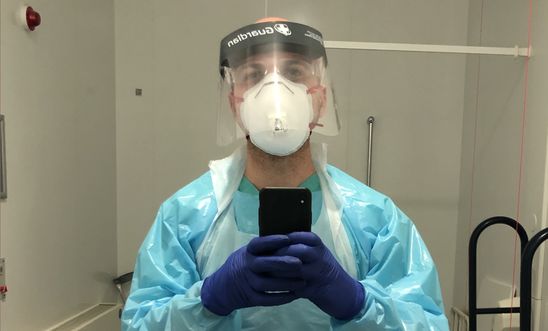
I’m an NHS cleaner and my video helped force a government U-turn

Hassan Akkad is a filmmaker, photojournalist and refugee. He cleans the Covid-19 ward in his local London hospital. On the 20th May, he posted a powerful message to Boris Johnson on the coronavirus bereavement scheme for NHS workers. His video went viral…
When the effects of Coronavirus started to spread, I looked for ways to help my community. My local hospital, Whipps Cross, urgently needed cleaners, and I applied. London has been my home for four years, and I wanted to help keep the community, NHS staff and patients safe.
I work 40 hours a week, mostly scrubbing toilets and mopping floors. Doing everything I can to make sure the ward is as safe and sanitary as possible. While the job is both physically and mentally taxing, my colleagues and I support one another. It feels like the United Nations—we are from over 10 different countries, including Nigeria, Ghana, Spain, the Caribbean, Somalia, and India, and we are all united to fight this virus.
I have worked at Whipps Cross for 56 days, but many of my colleagues have been employed there, or in the healthcare industry more generally, for at least 10 years. It is a privilege to experience their expertise. Catharine, or ‘mama’, is who we go to after a tough day. She moved to London from Trinidad 26 years ago and has been working in healthcare for more than 20 years.
It is unacceptable that it has taken a pandemic for us to realise the importance of NHS staff and other frontline workers. In my eyes, the NHS is the backbone of the nation, and I cringe every time I see Boris Johnson or Matt Hancock clapping. Government officials should be securing PPE, implementing policies that better support and fund the NHS and other essential services, and demonstrating in concrete ways that the UK values migrant NHS workers.
I was shocked to read the government decided to exclude me and my colleagues, who work as cleaners, porters and social care workers, from the bereavement scheme that grants families of health workers indefinite leave to remain in the UK if they die of coronavirus. My first thought was: we put our lives on the line and no one even cares.
Out of desperation, I sent a video message to Prime Minister Johnson on Twitter asking him to reconsider and whether this was really his way of thanking us for our effort to support our communities. I hoped he would remember his own recent experience with Covid-19 and realise the critical role migrant NHS workers played in his recovery.
The video got 5 million views and thousands of likes and retweets, with people voicing their support. And, just hours later, as a result of pressure from unions, politicians and the public, the government backtracked: bereaved families of all NHS workers can now get bereavement support and leave to remain. The following day the government made a second U-turn: migrant health workers will for now be exempt from NHS surcharges.
Throughout the pandemic it has been my hope that the UK will do more than just clap for the NHS. The response to the video I posted was an outstanding example of the impact our collective voice can have, as well as of the country’s ability to use our experiences of the pandemic to come together and demand better. I feel moved, grateful and, most of all, hopeful.
I will clean until I’m no longer needed. And I will keep campaigning for my NHS colleagues—most of whom are categorised as unskilled workers. If the new immigration points system is introduced, they would not be able to enter this country. Yet they are the ones on the frontline. If the value of migrant workers to the UK is still unclear, come tour my hospital when it is safe to do so and see what refugees and migrants are doing for this country.
Hassan Akkad arrived in London in 2015 after fleeing torture and prison in his home country Syria. He was interviewed for issue 205 of Amnesty Magazine. To get your free copy every quarter become a member today for only £4 a month join Amnesty